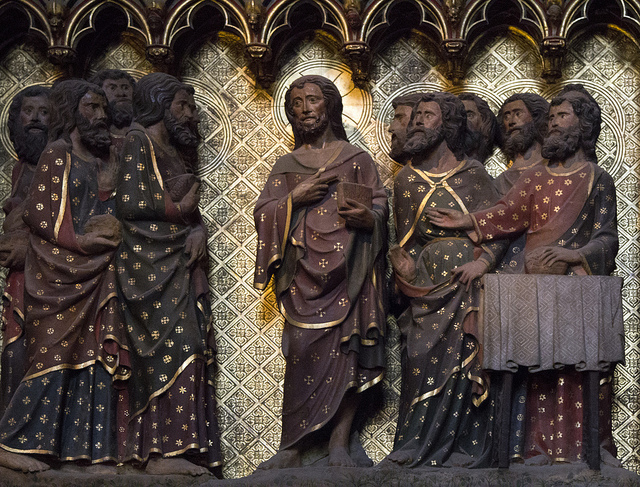“You are witnesses of these things” (Luke 24:48; Acts 3:15).
We certainly are. Thanks for the reminder, Jesus.
Because we need reminders of the resurrection — and often. Left to our own devices, left to the way in which life returns to normal after Easter, left to planning the last big worship push before summer, left to looking toward the end of the program year, left to confirmations and graduations, it’s all too easy to forget the resurrection.
Easter Sunday, only two weeks past, seems like an eternity ago, doesn’t it? And in many ways, it is. Because that’s how ministry works. The church goes on. Life goes on. Since Christ has been raised from the dead, all kinds of ministry acts have likely taken place: weddings, funerals, confirmation classes, Bible studies, hospital visits, commendations of the dying. Sure, we can see the resurrection promise in each of these experiences, but it does take some effort, and a reminder.
As a result, resurrection has the tendency to be a less than present reality, more likely a claim about a past event or a future assurance. Why is the presence of resurrection often overlooked? Understated? Even denied? Why do we seem to be more comfortable keeping resurrection in the past or postponing its promises for the future? Why is it so difficult? What are we afraid of?
Why is life, here and now, so hard to see?
I suspect there are a lot of reasons why. There is the simple truth that life is lived in the consciousness of death. And it seems that we have all too many reminders of death and not enough reminders of life. Globally, nationally, communally, personally, the presence of death is more palpable than the promise of life. I had one of those weeks last week: a dear friend, once vibrant and alive, now in the throws of chemo; aging parents facing heart surgery and recurrent ailments; a friend whose nine-year-old son was diagnosed with depression; my sister’s struggle in learning that their church secretary’s back pain was actually a body filled with cancer; listening to stories of broken relationships and then realizing some of your own. You know these weeks. You have lived these weeks. And so have your parishioners.
I also suspect that life, here and now, is hard to see because of fear: a fear of rejection; a fear that it could really be true. Seriously, what if the testimony of the women at the tomb was true? We are in good company when it comes to these fears. The women in Luke’s Gospel return from the tomb, go to the disciples and testify to what they themselves heard and witnessed, “Why do you look for the living among the dead? He is not here, but has risen. Remember how he told you, while he was still in Galilee, that the Son of Man must be handed over to sinners, and be crucified, and on the third day rise again” (Luke 24:5-7). And how do the disciples respond? They conclude that what the woman have to say is “an idle tale,” which, as many of you know, is the G-rated version of the Greek word better translated as “crap, garbage” or, yes, you guessed it, “bull … ”. Like the response to Jesus’ first sermon when the hometown folk want to throw him off a cliff (Luke 4:16-30), good news is rarely accepted at the first hearing. Why? Because rejection is easier than resurrection. If the resurrection really is true, well then, there goes life as we knew it. In the words of Anna Carter Florence, “if dead people don’t even stay dead, what is there to count on?” (Preaching Moment #10)
Life, here and now, is very hard to see. In the end, I think being resurrection people takes some effort, in fact, a lot of effort. And some weeks will demand more effort than others. Jesus knows this reality, our reality. And knows that we need a reminder. In fact, we probably need a lot of them, daily perhaps. Notice the tense of Jesus’ assertion — not “you were,” not “you will be,” but “you are.” I have a feeling Jesus takes that seriously. You are witnesses, here and now, in this moment. In this life. In your daily life. For the sake of life. Jesus reminds us of who we really are — resurrection people, resurrection witnesses. And it is also important to note that Jesus does not stop talking at verse 48 where the lectionary pericope ends. In verse 49, Jesus witnesses to what makes it possible to be witnesses — the promise of the Spirit.
We do not witness alone, as the first resurrection witness tells us, “Now it was Mary Magdalene, Joanna, Mary the mother of James, and the other women with them who told this to the apostles” (Luke 24:10).
We do not witness alone, as we sit amongst a community of fellow believers.
We do not witness alone, as the Spirit is indeed coming, and coming soon.
Our lives, on every level, need resurrection witnesses. Remind your congregation. Remind yourself.
Karoline

